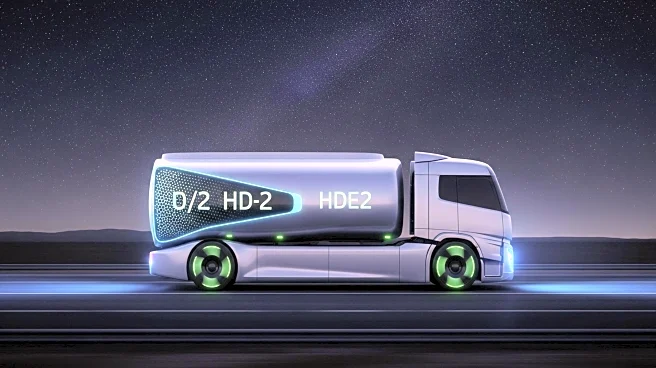What's Happening?
Hyundai Motor's hydrogen fuel cell autonomous truck, Xcient, has been named one of TIME magazine's 'Best Inventions of 2025.' The announcement was made on October 9, highlighting Xcient among 300 innovations across various categories, including robotics and artificial intelligence. The truck is categorized under 'Experimental' due to its advanced technology. Hyundai's model combines its hydrogen-powered Xcient truck with 'SuperDrive,' a Level 4 autonomous driving software developed by PlusAI, a U.S. commercial vehicle automation company. Level 4 autonomy allows the vehicle to operate without human intervention under specific conditions. Other Korean products featured on TIME's list include innovations from Samsung Electronics and LG Electronics.
Why It's Important?
The recognition of Hyundai's Xcient truck as one of TIME's best inventions underscores the growing importance of sustainable and autonomous technologies in the automotive industry. This accolade not only highlights Hyundai's commitment to innovation but also positions the company as a leader in the development of eco-friendly transportation solutions. The use of hydrogen fuel cells and autonomous driving technology could significantly impact the future of logistics and transportation, offering cleaner and more efficient alternatives to traditional diesel-powered vehicles. This development may encourage other automakers to invest in similar technologies, potentially leading to broader adoption and advancements in sustainable transportation.
What's Next?
Hyundai's recognition by TIME may lead to increased interest and investment in hydrogen fuel cell technology and autonomous vehicles. As the industry moves towards more sustainable solutions, Hyundai's innovations could pave the way for further advancements and collaborations in the field. The company may continue to refine and expand its autonomous driving capabilities, potentially exploring new markets and applications for its technology. Additionally, the success of Xcient could influence regulatory discussions and policies regarding autonomous vehicles and hydrogen fuel infrastructure, promoting wider acceptance and integration of these technologies.











